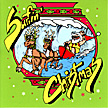 These guys won't be having any trouble with the Federal Trade Commission with an album title like this one. Here we have a cool dozen classic Christmas carols rendered as surf instrumentals, except for vocals on "Rudolph the Red-Nosed Reindeer" and "We Wish You a Merry Christmas," which lapses into a bit of "Small World" with different verses in different languages. The rest is straight 60's surf guitar soloing over good old-fashioned drums. The band even credits their source for vintage instruments in the liner notes, too. From 1996. UPDATE: Biographical information for this group is hard to come by, but the folks at Fat City Cigar Lounge seem to think they're a bunch of studio musicians from Amsterdam.
These guys won't be having any trouble with the Federal Trade Commission with an album title like this one. Here we have a cool dozen classic Christmas carols rendered as surf instrumentals, except for vocals on "Rudolph the Red-Nosed Reindeer" and "We Wish You a Merry Christmas," which lapses into a bit of "Small World" with different verses in different languages. The rest is straight 60's surf guitar soloing over good old-fashioned drums. The band even credits their source for vintage instruments in the liner notes, too. From 1996. UPDATE: Biographical information for this group is hard to come by, but the folks at Fat City Cigar Lounge seem to think they're a bunch of studio musicians from Amsterdam.January 2008 Archives
 These guys won't be having any trouble with the Federal Trade Commission with an album title like this one. Here we have a cool dozen classic Christmas carols rendered as surf instrumentals, except for vocals on "Rudolph the Red-Nosed Reindeer" and "We Wish You a Merry Christmas," which lapses into a bit of "Small World" with different verses in different languages. The rest is straight 60's surf guitar soloing over good old-fashioned drums. The band even credits their source for vintage instruments in the liner notes, too. From 1996. UPDATE: Biographical information for this group is hard to come by, but the folks at Fat City Cigar Lounge seem to think they're a bunch of studio musicians from Amsterdam.
These guys won't be having any trouble with the Federal Trade Commission with an album title like this one. Here we have a cool dozen classic Christmas carols rendered as surf instrumentals, except for vocals on "Rudolph the Red-Nosed Reindeer" and "We Wish You a Merry Christmas," which lapses into a bit of "Small World" with different verses in different languages. The rest is straight 60's surf guitar soloing over good old-fashioned drums. The band even credits their source for vintage instruments in the liner notes, too. From 1996. UPDATE: Biographical information for this group is hard to come by, but the folks at Fat City Cigar Lounge seem to think they're a bunch of studio musicians from Amsterdam.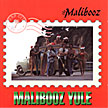 More surf music for Christmas, but with a twist; a lot of these tunes are apparently originals, unless I somehow overlooked the Percy Faith Orchestra's version of "Santa Drives a Super Stock Dodge:" "And I heard him exclaim as he headed down Vine/Merry Christmas to all, now hear my Hemi whine!" These guys apparently are trying to channel the Beach Boys and come pretty close on many of these songs. This album is a reissue of A Malibu Kind of Christmas, circa 1992; they changed the title but very little else to tie in with another album of theirs, Malibooz Rule. The group is John Zambetti and Walter Egan, the latter the author of a solo album produced by Lindsay Buckingham and Stevie Nicks, and they have a website. "It's Just Not Christmas" evokes middle-period Brian Wilson after the breakdown but before "Smile," and many others, like "When Santa Comes to Santa Cruz," "And a Happy New Year" and "Santa Man" definitely touch on several Beach Boys hits. Non-originals include "Little Surfin' Drummer Boy," something that's been done before but the Malibooz throw in a little "Papa-Oom-Mow-Mow" vocalizing, and "Carol of the Swells" surfs up the carol about the bells. Then there's "Rudy, the Hodad Surf Dude," based on Rudolph's song, in which a stranded Santa gets a loan of a surfboard to salvage the holiday. And the album ends with "Christmas Wrap," another surf adaption, in this case "A Visit From St. Nicholas," who was, wait for it, surfing. Fourteen tunes was a little too many for a one-joke album, but there's plenty of good stuff here. UPDATE: Malibooz Rule has one more holiday tune, "Santa's Gone Surfin'."
More surf music for Christmas, but with a twist; a lot of these tunes are apparently originals, unless I somehow overlooked the Percy Faith Orchestra's version of "Santa Drives a Super Stock Dodge:" "And I heard him exclaim as he headed down Vine/Merry Christmas to all, now hear my Hemi whine!" These guys apparently are trying to channel the Beach Boys and come pretty close on many of these songs. This album is a reissue of A Malibu Kind of Christmas, circa 1992; they changed the title but very little else to tie in with another album of theirs, Malibooz Rule. The group is John Zambetti and Walter Egan, the latter the author of a solo album produced by Lindsay Buckingham and Stevie Nicks, and they have a website. "It's Just Not Christmas" evokes middle-period Brian Wilson after the breakdown but before "Smile," and many others, like "When Santa Comes to Santa Cruz," "And a Happy New Year" and "Santa Man" definitely touch on several Beach Boys hits. Non-originals include "Little Surfin' Drummer Boy," something that's been done before but the Malibooz throw in a little "Papa-Oom-Mow-Mow" vocalizing, and "Carol of the Swells" surfs up the carol about the bells. Then there's "Rudy, the Hodad Surf Dude," based on Rudolph's song, in which a stranded Santa gets a loan of a surfboard to salvage the holiday. And the album ends with "Christmas Wrap," another surf adaption, in this case "A Visit From St. Nicholas," who was, wait for it, surfing. Fourteen tunes was a little too many for a one-joke album, but there's plenty of good stuff here. UPDATE: Malibooz Rule has one more holiday tune, "Santa's Gone Surfin'."
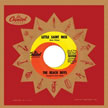 This trademark 1963 Beach Boys Christmas song gets a good bit of radio play at Christmas, but it hasn't traveled well over the years, since the car culture it was based on hasn't maintained its place in the popular consciousness. Nevertheless, it was inspired for its time and is still fun to hear; I imagine Little Saint Nick drag-racing the sleighs in "Jingle Bells" and "Sleigh Bells," not to mention chasing after Chuck Berry's Rudolph. A full album followed a year later.
This trademark 1963 Beach Boys Christmas song gets a good bit of radio play at Christmas, but it hasn't traveled well over the years, since the car culture it was based on hasn't maintained its place in the popular consciousness. Nevertheless, it was inspired for its time and is still fun to hear; I imagine Little Saint Nick drag-racing the sleighs in "Jingle Bells" and "Sleigh Bells," not to mention chasing after Chuck Berry's Rudolph. A full album followed a year later.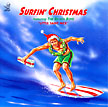 The first surf-oriented Christmas song, beating the Beach Boys to the racks by a year (1963). It uses the time-tested "tell Santa what you want" method of writing Christmas songs, but their way was influential enough to inspire the Turtles' update "Santa and the Sidewalk Surfer," more of a spoken-word novelty, and the spoken bridge to The Ravers' "Punk Rock Xmas." UPDATE: Thanks to Radio Rumpus Room (KFAI-FM Minneapolis St. Paul) for telling us the B-side of the original vinyl single was "Santa's Speed Shop."
The first surf-oriented Christmas song, beating the Beach Boys to the racks by a year (1963). It uses the time-tested "tell Santa what you want" method of writing Christmas songs, but their way was influential enough to inspire the Turtles' update "Santa and the Sidewalk Surfer," more of a spoken-word novelty, and the spoken bridge to The Ravers' "Punk Rock Xmas." UPDATE: Thanks to Radio Rumpus Room (KFAI-FM Minneapolis St. Paul) for telling us the B-side of the original vinyl single was "Santa's Speed Shop."
 This merry band of musicologists masquerading as the world's screwiest polka combo take on Latin forms like samba, cha cha, ranchera as well as the waltz and ska on this lighthearted 1991 Christmas album. There are a few originals mixed in among the standards, like "It's Christmas," "Christmas in July," "Corrido Navideno" and "Santa's Polka," along with the classics that get patented Brave Combo arrangements, like a ska "The Christmas Song," "The Little Drummer Boy" as guaguanco, a samba "O Christmas Tree," and surprisingly, a straight blues reading of "Please Come Home For Christmas." They also did a version of "Oh Holy Night Cha Cha Cha" on their Musical Varieties album. Hanukkah alert: a hora version of "Hanukkah Oh Hanukkah."
This merry band of musicologists masquerading as the world's screwiest polka combo take on Latin forms like samba, cha cha, ranchera as well as the waltz and ska on this lighthearted 1991 Christmas album. There are a few originals mixed in among the standards, like "It's Christmas," "Christmas in July," "Corrido Navideno" and "Santa's Polka," along with the classics that get patented Brave Combo arrangements, like a ska "The Christmas Song," "The Little Drummer Boy" as guaguanco, a samba "O Christmas Tree," and surprisingly, a straight blues reading of "Please Come Home For Christmas." They also did a version of "Oh Holy Night Cha Cha Cha" on their Musical Varieties album. Hanukkah alert: a hora version of "Hanukkah Oh Hanukkah."
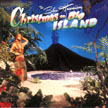 A little South Pacific surf, a little boogie and lots of steel guitar and you have The Blue Hawaiians. And what could be more natural for a band like this one than to do a Christmas album? Lots of things. Nevertheless, this short (10 songs) but energetic album from 1995 has plenty to recommend it. Most of the tunes are instrumentals, except for "Jingle Jangle," "Blue Christmas," the title song and "Mele Kalikimaka," the official Hawaiian Christmas song. The band manages to maintain a tension between their trademark sound and the material, which also includes "Christmas Time is Here," "White Christmas," "Have Yourself a Quiet (Merry) Little Christmas" and a medley of "We Four Kings (The Little Drummer Boy)" in which the little drummer played on the Surfaris' "Wipe Out" in a former life.
A little South Pacific surf, a little boogie and lots of steel guitar and you have The Blue Hawaiians. And what could be more natural for a band like this one than to do a Christmas album? Lots of things. Nevertheless, this short (10 songs) but energetic album from 1995 has plenty to recommend it. Most of the tunes are instrumentals, except for "Jingle Jangle," "Blue Christmas," the title song and "Mele Kalikimaka," the official Hawaiian Christmas song. The band manages to maintain a tension between their trademark sound and the material, which also includes "Christmas Time is Here," "White Christmas," "Have Yourself a Quiet (Merry) Little Christmas" and a medley of "We Four Kings (The Little Drummer Boy)" in which the little drummer played on the Surfaris' "Wipe Out" in a former life.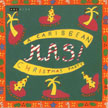 So how do people who've only ever seen snow on television, if then, celebrate Christmas? This 1992 compilation goes a long way toward answering that question. The songs here run from the early 1960s to the 90s and include some catchy numbers, like Lord Nelson's "A Party for Santa Claus" and Machel's "Soca Santa," probably the only song in which Santa trades his sleigh not for a Cadillac, but "a big time Toyota." Jacob Miller and Ray I do a reggae turn on "Deck the Halls" and Carlene Davis and Trinity change James Brown's demand into a question in "Santa Claus (Do You Ever Come to the Ghetto)." And James Spence's "Santa Claus is Coming to Town" sounds like an Alan Lomax field holler, but at least it isn't played in Phil Spector's arrangement yet again. A big chunk of the album is an 18-minute medley of Christmas songs in French by Eddy Gustave, which isn't bad but goes on way too long to suit me. Still worthwhile holiday listening, especially if your Christmases include lots of sand, sun and rum. Out of print, but the Amazon page (click album cover) still offers 30-second samples.
So how do people who've only ever seen snow on television, if then, celebrate Christmas? This 1992 compilation goes a long way toward answering that question. The songs here run from the early 1960s to the 90s and include some catchy numbers, like Lord Nelson's "A Party for Santa Claus" and Machel's "Soca Santa," probably the only song in which Santa trades his sleigh not for a Cadillac, but "a big time Toyota." Jacob Miller and Ray I do a reggae turn on "Deck the Halls" and Carlene Davis and Trinity change James Brown's demand into a question in "Santa Claus (Do You Ever Come to the Ghetto)." And James Spence's "Santa Claus is Coming to Town" sounds like an Alan Lomax field holler, but at least it isn't played in Phil Spector's arrangement yet again. A big chunk of the album is an 18-minute medley of Christmas songs in French by Eddy Gustave, which isn't bad but goes on way too long to suit me. Still worthwhile holiday listening, especially if your Christmases include lots of sand, sun and rum. Out of print, but the Amazon page (click album cover) still offers 30-second samples.
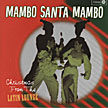 This now-out-of-print 2000 disc is subtitled "Christmas From the Latin Lounge," and that last word is key; better than half the stuff on here is basically lounge music, although the "mambo" part of the title does come into play as well. Some of the giants of that genre, such as Hugo Winterhalter and Esquivel, are here, and some 50s R&B pays a visit too, such as The Enchanters' "Mambo Santa Mambo" and "Rockin' 'J' Bells" by Little Bobby Rey, who returns later in the album with a Latin-flavored "Corrido de Auld Lang Syne." Bill Darnel and The Smith Brothers do a white-bread version of "We Wanna See Santa Do The Mambo," at least compared to Big John Greer's version, preserved on Rhino's Hipsters' Holiday CD. Steve Allen, the late great Steverino himself, contributes an original, "How Can Santa Come to Puerto Rico," performed by Ricky Vera. Jimmy Boyd, the 1950s pre-pubescent king of Christmas, is here with "I Saw Mommy Do the Mambo (With You Know Who)." An often-used Latin number, Augie Rios' "Donde Esta Santa Claus," makes another apperance here, and Pittsburgh's favorite sons The Flashcats treat us to the only modern-day track, "December Twenty 5," a parody of Lou Bega's "Mambo No. 5." Copious liner notes in the Rhino tradition are contributed by Eddie Gorodetsky, better known to Christmas collectors as Eddie G.
This now-out-of-print 2000 disc is subtitled "Christmas From the Latin Lounge," and that last word is key; better than half the stuff on here is basically lounge music, although the "mambo" part of the title does come into play as well. Some of the giants of that genre, such as Hugo Winterhalter and Esquivel, are here, and some 50s R&B pays a visit too, such as The Enchanters' "Mambo Santa Mambo" and "Rockin' 'J' Bells" by Little Bobby Rey, who returns later in the album with a Latin-flavored "Corrido de Auld Lang Syne." Bill Darnel and The Smith Brothers do a white-bread version of "We Wanna See Santa Do The Mambo," at least compared to Big John Greer's version, preserved on Rhino's Hipsters' Holiday CD. Steve Allen, the late great Steverino himself, contributes an original, "How Can Santa Come to Puerto Rico," performed by Ricky Vera. Jimmy Boyd, the 1950s pre-pubescent king of Christmas, is here with "I Saw Mommy Do the Mambo (With You Know Who)." An often-used Latin number, Augie Rios' "Donde Esta Santa Claus," makes another apperance here, and Pittsburgh's favorite sons The Flashcats treat us to the only modern-day track, "December Twenty 5," a parody of Lou Bega's "Mambo No. 5." Copious liner notes in the Rhino tradition are contributed by Eddie Gorodetsky, better known to Christmas collectors as Eddie G.
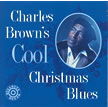 This site credits Brown with the beginnings of rock 'n roll Christmas music for his original 1947 recording of "Merry Christmas Baby" with Johnny Moore's Three Blazers. While there are earlier blues Christmas tunes, Brown's further work in the Christmas genre carried through into the Fifties and Sixties when new originals and novelties began to sweep the pop, rock and country charts. And of course, his original hit has become a staple in the rock and blues fields. Because getting paid for your work has tended to be a sporadic proposition in the music business, blues artists with long careers have often re-recorded their best-known songs for multiple labels in hopes of putting food on the table. So here comes Brown in 1994 with a full CD of Christmas music, revisiting some of his favorites like "Merry Christmas Baby," Billy Ward's "Christmas in Heaven" and "Please Come Home For Christmas." To those, this CD adds "Christmas Comes but Once a Year," "Santa's Blues," a gospel-tinged "Silent Night," "Bringing In a Brand New Year" and "A Song For Christmas." Surprisingly, he throws in a couple of non-holiday originals, the uptempo "Stay With Me" and the ballad "To Someone That I Love." The Brown oeuvre is a bit on the mellow side (see Elvis Costello's great story about writing for Brown on his "A Case For Song" video), but this album is a good way to remember the late bluesman.
This site credits Brown with the beginnings of rock 'n roll Christmas music for his original 1947 recording of "Merry Christmas Baby" with Johnny Moore's Three Blazers. While there are earlier blues Christmas tunes, Brown's further work in the Christmas genre carried through into the Fifties and Sixties when new originals and novelties began to sweep the pop, rock and country charts. And of course, his original hit has become a staple in the rock and blues fields. Because getting paid for your work has tended to be a sporadic proposition in the music business, blues artists with long careers have often re-recorded their best-known songs for multiple labels in hopes of putting food on the table. So here comes Brown in 1994 with a full CD of Christmas music, revisiting some of his favorites like "Merry Christmas Baby," Billy Ward's "Christmas in Heaven" and "Please Come Home For Christmas." To those, this CD adds "Christmas Comes but Once a Year," "Santa's Blues," a gospel-tinged "Silent Night," "Bringing In a Brand New Year" and "A Song For Christmas." Surprisingly, he throws in a couple of non-holiday originals, the uptempo "Stay With Me" and the ballad "To Someone That I Love." The Brown oeuvre is a bit on the mellow side (see Elvis Costello's great story about writing for Brown on his "A Case For Song" video), but this album is a good way to remember the late bluesman.
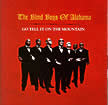 After some 70 years, it's neat that these blues/gospel pioneers are suddenly making a crossover move; you might be familiar with their recent version of "Amazing Grace" sung to the melody of "House of the Rising Sun." Now they've put their stamp on the holiday with this 2003 album featuring not only their own distinctive sound but a collection of collaborations with other popular artists. Tom Waits fans will snap this up just for his appearance on the title song, Chrissie Hynde lends her distinctive lead to "In the Bleak Midwinter" with guitar by Richard Thompson, Aaron Neville gets back to church on "Joy to the World," and Michael Franti, known for his work with Spearhead, talks the verse to "Little Drummer Boy." Solomon Burke continues his comeback with "I Pray on Christmas." Mavis Staples joins the group for "Born in Bethlehem," also known as "Children Go Where I Send Thee," which is good but seems to go on a little long. A witty 12-bar blues remake of "Away in a Manger" features George Clinton, and Me'Shell NdegeOcello talks the lyric and plays piano over the group singing a close harmony "O Come All Ye Faithful." Jazz grabs the spotlight here as Shelby Lynne does "The Christmas Song (Chestnuts Roasting)" and Les McCann plays and sings on "White Christmas," and the group works alone on the opening "Last Month of the Year" and the closing "Silent Night." UPDATE: For 2004 they've released a video version of this on DVD.
After some 70 years, it's neat that these blues/gospel pioneers are suddenly making a crossover move; you might be familiar with their recent version of "Amazing Grace" sung to the melody of "House of the Rising Sun." Now they've put their stamp on the holiday with this 2003 album featuring not only their own distinctive sound but a collection of collaborations with other popular artists. Tom Waits fans will snap this up just for his appearance on the title song, Chrissie Hynde lends her distinctive lead to "In the Bleak Midwinter" with guitar by Richard Thompson, Aaron Neville gets back to church on "Joy to the World," and Michael Franti, known for his work with Spearhead, talks the verse to "Little Drummer Boy." Solomon Burke continues his comeback with "I Pray on Christmas." Mavis Staples joins the group for "Born in Bethlehem," also known as "Children Go Where I Send Thee," which is good but seems to go on a little long. A witty 12-bar blues remake of "Away in a Manger" features George Clinton, and Me'Shell NdegeOcello talks the lyric and plays piano over the group singing a close harmony "O Come All Ye Faithful." Jazz grabs the spotlight here as Shelby Lynne does "The Christmas Song (Chestnuts Roasting)" and Les McCann plays and sings on "White Christmas," and the group works alone on the opening "Last Month of the Year" and the closing "Silent Night." UPDATE: For 2004 they've released a video version of this on DVD.
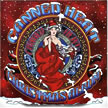 The legendary boogie band's big Christmas move up until now was the 1968 novelty "The Christmas Song," in which they appear with David Seville's Chipmunks. True story, and that song's on this CD, along with its B-side, "Christmas Blues," in two versions, one of which features Dr. John on piano. Despite the demise of three original members, the band continues on touring and recording, so this album is mainly comprised of performances by the current lineup, plus a third version of "Christmas Blues" featuring John Popper and Eric Clapton. This is a solid blues recording all told, and the later performances are in keeping with the band's original vision. Not too many surprises here, though the version of "Drummer Boy," renamed "Boogie Boy" here, takes the carol down to a slow blues tempo and takes some liberties with the lyrics. Might be worth having just for the Chipmunks if you're a novelty fan, though the rest will satisfy blues lovers.
The legendary boogie band's big Christmas move up until now was the 1968 novelty "The Christmas Song," in which they appear with David Seville's Chipmunks. True story, and that song's on this CD, along with its B-side, "Christmas Blues," in two versions, one of which features Dr. John on piano. Despite the demise of three original members, the band continues on touring and recording, so this album is mainly comprised of performances by the current lineup, plus a third version of "Christmas Blues" featuring John Popper and Eric Clapton. This is a solid blues recording all told, and the later performances are in keeping with the band's original vision. Not too many surprises here, though the version of "Drummer Boy," renamed "Boogie Boy" here, takes the carol down to a slow blues tempo and takes some liberties with the lyrics. Might be worth having just for the Chipmunks if you're a novelty fan, though the rest will satisfy blues lovers.
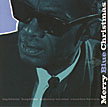 This 2002 compilation is a quickie job, no liner notes and no marketing, and four of 12 cuts are all by Charles Brown. Very little art involved. Brown gets four cuts because he deserves them; as mentioned elsewhere, he's the godfather of rock holiday music with "Merry Christmas Baby," first recorded in 1947. He's got numerous others under his belt, including the smash holiday hit "Please Come Home For Christmas," along with "Christmas Present Blues" and "Christmas in Heaven." All these Brown cuts, except "Please," sound like they're from sometime in the late 60s and early 70s, though, suggesting the producers simply snapped up performances for which the rights were cheap. (One of the lessons this CD inadvertently teaches you is that blues artists often re-recorded their best-known songs in hopes the next company, unlike the last one, would actually pay them this time.) "Please" also gets a reprise at the end of the album in a version by Johnny Winter. Lowell Fulson's "Lonesome Christmas (Part 1 and 2)" is here, with the two sides of the single simply indexed together into a single cut. Also on hand are Big Joe Williams with "Christmas Blues, "Johnny Adams' soulful "Silver Bells," Smokey Hogg's ballad "I Want My Baby For Christmas," Big Joe Turner's vintage "Christmas Date Blues," Lightnin' Hopkins' "Christmas Blues" and Lester Williams' "Wintertime Blues."
This 2002 compilation is a quickie job, no liner notes and no marketing, and four of 12 cuts are all by Charles Brown. Very little art involved. Brown gets four cuts because he deserves them; as mentioned elsewhere, he's the godfather of rock holiday music with "Merry Christmas Baby," first recorded in 1947. He's got numerous others under his belt, including the smash holiday hit "Please Come Home For Christmas," along with "Christmas Present Blues" and "Christmas in Heaven." All these Brown cuts, except "Please," sound like they're from sometime in the late 60s and early 70s, though, suggesting the producers simply snapped up performances for which the rights were cheap. (One of the lessons this CD inadvertently teaches you is that blues artists often re-recorded their best-known songs in hopes the next company, unlike the last one, would actually pay them this time.) "Please" also gets a reprise at the end of the album in a version by Johnny Winter. Lowell Fulson's "Lonesome Christmas (Part 1 and 2)" is here, with the two sides of the single simply indexed together into a single cut. Also on hand are Big Joe Williams with "Christmas Blues, "Johnny Adams' soulful "Silver Bells," Smokey Hogg's ballad "I Want My Baby For Christmas," Big Joe Turner's vintage "Christmas Date Blues," Lightnin' Hopkins' "Christmas Blues" and Lester Williams' "Wintertime Blues."
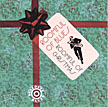 It's been about 30 years since the last time I saw Roomful of Blues rock a blues bar, and that's got to be my loss, since this 1997 holiday album is a blues classic you can listen to all the way through -- between Thanksgiving and New Year's, anyway. The group resisted the temptation to generate a batch of original tunes or to reinterpret the more antique carols in favor of playing 10 mostly familiar pop, rock and blues holiday classics. Their "White Christmas" is a solid mix tape/CD choice, kicking off with a touch of Aaron Neville balladry and swinging into a New Orleans march -- definitely an original approach. The album kicks off solidly with Lloyd Glenn's "Christmas Celebration" and follows up with a rockin' version of Fats Domino's "I Told Santa Claus," with the vocalist doing a Fats impression. There aren't a lot of surprises on here, but solid execution on such favorites as "Run Rudolph Run," "The Christmas Song," "Let It Snow," "Have Yourself a Merry Little Christmas," Count Basie's "Good Morning Blues," Jesse Belvin's "I Want You With Me Christmas" and Lowell Fulson's "I Want to Spend Christmas With You" make it all worthwhile.
It's been about 30 years since the last time I saw Roomful of Blues rock a blues bar, and that's got to be my loss, since this 1997 holiday album is a blues classic you can listen to all the way through -- between Thanksgiving and New Year's, anyway. The group resisted the temptation to generate a batch of original tunes or to reinterpret the more antique carols in favor of playing 10 mostly familiar pop, rock and blues holiday classics. Their "White Christmas" is a solid mix tape/CD choice, kicking off with a touch of Aaron Neville balladry and swinging into a New Orleans march -- definitely an original approach. The album kicks off solidly with Lloyd Glenn's "Christmas Celebration" and follows up with a rockin' version of Fats Domino's "I Told Santa Claus," with the vocalist doing a Fats impression. There aren't a lot of surprises on here, but solid execution on such favorites as "Run Rudolph Run," "The Christmas Song," "Let It Snow," "Have Yourself a Merry Little Christmas," Count Basie's "Good Morning Blues," Jesse Belvin's "I Want You With Me Christmas" and Lowell Fulson's "I Want to Spend Christmas With You" make it all worthwhile.
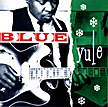 If there's a Christmas album of blues material that's indispensable, it would be this thoughtfully compiled, packaged and annotated collection from the folks at Rhino. The cuts on here range from 1950 to 1990 and bring latter-day blues stars together with some of the genre's pioneers. Lightning Hopkins wishes us "Merry Christmas" and "Happy New Year" from the same 1953 single, Charles Brown reprises his classic "Merry Christmas Baby," Sonny Boy Williamson rifles through dresser drawers as he sings "Santa Claus," Louis Jordan's last recording "Santa Claus Santa Claus" is here, along with John Lee Hooker's "Blues for Christmas." Johnny and Edgar Winter, billed as The Insight, do Charles Brown's other classic, "Please Come Home for Christmas." My favorites include "Santa's Messin' With the Kid" by Eddie C. Campbell and Detroit Jr.'s "Christmas Day." Oh, and Canned Heat's "Christmas Blues" is on here -- the version they perform alone, not the one they share with Alvin and the Chipmunks.
If there's a Christmas album of blues material that's indispensable, it would be this thoughtfully compiled, packaged and annotated collection from the folks at Rhino. The cuts on here range from 1950 to 1990 and bring latter-day blues stars together with some of the genre's pioneers. Lightning Hopkins wishes us "Merry Christmas" and "Happy New Year" from the same 1953 single, Charles Brown reprises his classic "Merry Christmas Baby," Sonny Boy Williamson rifles through dresser drawers as he sings "Santa Claus," Louis Jordan's last recording "Santa Claus Santa Claus" is here, along with John Lee Hooker's "Blues for Christmas." Johnny and Edgar Winter, billed as The Insight, do Charles Brown's other classic, "Please Come Home for Christmas." My favorites include "Santa's Messin' With the Kid" by Eddie C. Campbell and Detroit Jr.'s "Christmas Day." Oh, and Canned Heat's "Christmas Blues" is on here -- the version they perform alone, not the one they share with Alvin and the Chipmunks.
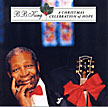 Surprisingly, this 2003 collection is B.B.'s first-ever Christmas album, at least according to the liner notes. Bob Bailey tells us that B.B. recorded "Christmas Celebration" in 1962, a new version of which appears here, and his version of "Merry Christmas Baby," also heard here, goes back to at least 1997. One of history's greatest still-surviving blues musicians, he puts together a 13-track holiday celebration, heavy on the Christmas blues chestnuts. Four are straight out of the Charles Brown songbook: "Please Come Home For Christmas," "Merry Christmas Baby," "To Someone That I Love" and "Bringing In a Brand New Year." He also does "Back Door Santa," a different version than the duet with John Popper on 2001's A Very Special Christmas 5, and contributes a couple of originals, "Christmas Celebration" and "Christmas Love," the latter an instrumental, joining "I'll Be Home For Christmas" and "Auld Lang Syne" in featuring King's guitar rather than his voice. There's a song called "Lonesome Christmas" that I don't recognize; it's not the Lowell Fulson song. If you like B.B. and his big band blues sound, this is a great album, Christmas or anytime.
Surprisingly, this 2003 collection is B.B.'s first-ever Christmas album, at least according to the liner notes. Bob Bailey tells us that B.B. recorded "Christmas Celebration" in 1962, a new version of which appears here, and his version of "Merry Christmas Baby," also heard here, goes back to at least 1997. One of history's greatest still-surviving blues musicians, he puts together a 13-track holiday celebration, heavy on the Christmas blues chestnuts. Four are straight out of the Charles Brown songbook: "Please Come Home For Christmas," "Merry Christmas Baby," "To Someone That I Love" and "Bringing In a Brand New Year." He also does "Back Door Santa," a different version than the duet with John Popper on 2001's A Very Special Christmas 5, and contributes a couple of originals, "Christmas Celebration" and "Christmas Love," the latter an instrumental, joining "I'll Be Home For Christmas" and "Auld Lang Syne" in featuring King's guitar rather than his voice. There's a song called "Lonesome Christmas" that I don't recognize; it's not the Lowell Fulson song. If you like B.B. and his big band blues sound, this is a great album, Christmas or anytime.
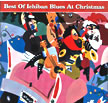 Atlanta's Ichiban label has specialized in modern blues acts for years, and there were, I believe, four complete Christmas collections by the label. In 2002, this single compilation culled songs from the original four to create a best-of collection. Near as I can tell, these performances span the early to mid '90s. Francine Reed, a frequent Lyle Lovett collaborator, kicks off with a shuffle version of "Go Tell It On the Mountain," Blues Boy Willie does his own "Christmas Pretty Baby" boogie; "I Wanna Be Your Santa Claus" by Jerry McCain is a stop-start blues in the style of "Framed"; McCain returns later with "Absent Minded Santa," then joins with Gary B.B. Coleman at the end of the album with the slow blues "Sad, Sad Christmas." Other notable cuts are Drink Small's "Christmas, Don't Forget About Me," Little Johnny Taylor's "Christmas Is Here Again" and "Santa Claus Got the Blues" by Travis Haddix. I've heard the original albums are out of print, but they still come up in an Amazon search. UPDATE: Amazon now has all the four original Ichiban Christmas collections for download. Click on the album cover to hook up.
Atlanta's Ichiban label has specialized in modern blues acts for years, and there were, I believe, four complete Christmas collections by the label. In 2002, this single compilation culled songs from the original four to create a best-of collection. Near as I can tell, these performances span the early to mid '90s. Francine Reed, a frequent Lyle Lovett collaborator, kicks off with a shuffle version of "Go Tell It On the Mountain," Blues Boy Willie does his own "Christmas Pretty Baby" boogie; "I Wanna Be Your Santa Claus" by Jerry McCain is a stop-start blues in the style of "Framed"; McCain returns later with "Absent Minded Santa," then joins with Gary B.B. Coleman at the end of the album with the slow blues "Sad, Sad Christmas." Other notable cuts are Drink Small's "Christmas, Don't Forget About Me," Little Johnny Taylor's "Christmas Is Here Again" and "Santa Claus Got the Blues" by Travis Haddix. I've heard the original albums are out of print, but they still come up in an Amazon search. UPDATE: Amazon now has all the four original Ichiban Christmas collections for download. Click on the album cover to hook up.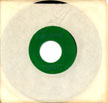 The copy I have was issued in 1975, but I don't know if this was the original release. Freddie was the lesser-known of the three virtuoso blues guitarists named King, but he was a major influence on Eric Clapton. These two tunes fill the bill quite well if you need a Christmas blues, "I Hear Jingle Bells" being the uptempo number while "Tears" is a slow blues. Bob Bailey lets us know this pair of tunes is from 1961, and while they've been on compilations and even a Freddie King album, the versions out there appear to be dubbed from vinyl copies, and mediocre ones at that.
The copy I have was issued in 1975, but I don't know if this was the original release. Freddie was the lesser-known of the three virtuoso blues guitarists named King, but he was a major influence on Eric Clapton. These two tunes fill the bill quite well if you need a Christmas blues, "I Hear Jingle Bells" being the uptempo number while "Tears" is a slow blues. Bob Bailey lets us know this pair of tunes is from 1961, and while they've been on compilations and even a Freddie King album, the versions out there appear to be dubbed from vinyl copies, and mediocre ones at that.
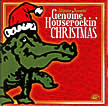 The venerable blues label waited more than a decade before jumping back into the Christmas fray with a new compilation for 2003. Some of the same folks are on both collections, but there are younger artists here as well. Hardly any covers on this CD either, except for the Holmes Brothers' funky take of "Back Door Santa," and I'm not sure if the slow blues "Christmas Snow" by Michael Burks is an old song or a new one. (Sean Delany tips us that it's a cover of Willie Hill from volume 4 of Ichiban's now-out-of-print blues Christmas series.) Carey Bell's "Christmas Train" is a fast shuffle, Li'l Ed and the Blues Imperials get off a medium shuffle on "Christmas Time," and Koko Taylor gets our attention with "Have You Heard the News." Shemekia Copeland flirts convincingly on "Stay a Little Longer, Santa," jazzing things up just a bit. W.C. Clark calls out the big band blues sound on "Christmas Party," C.J. Chenier and the Red Hot Louisiana Band breaks out the gumbo for "Zydeco Christmas," and Marcia Ball takes the same approach on "Christmas Fais Do Do." The country blues sound comes courtesy of Cephas and Wiggins on "Christmas Day Blues," Roomful of Blues asks "Santa Claus, Do You Ever Get the Blues," Saffire - The Uppity Blues Women, boogie-woogie their lighthearted "Really Been Good This Year," Lonnie Brooks gives us the stomper "All I Want for Christmas (Is to Be With You)," Coco Montoya does a pop-oriented "Bluesman's Christmas," Dave Hole's "Fattening Up the Turkey" is pretty gritty, and Little Charlie and the Nightcaps sneak in a little social commentary with "Christmas Time Again (Spend, Spend, Spend)." Solid performances, eminently listenable.
The venerable blues label waited more than a decade before jumping back into the Christmas fray with a new compilation for 2003. Some of the same folks are on both collections, but there are younger artists here as well. Hardly any covers on this CD either, except for the Holmes Brothers' funky take of "Back Door Santa," and I'm not sure if the slow blues "Christmas Snow" by Michael Burks is an old song or a new one. (Sean Delany tips us that it's a cover of Willie Hill from volume 4 of Ichiban's now-out-of-print blues Christmas series.) Carey Bell's "Christmas Train" is a fast shuffle, Li'l Ed and the Blues Imperials get off a medium shuffle on "Christmas Time," and Koko Taylor gets our attention with "Have You Heard the News." Shemekia Copeland flirts convincingly on "Stay a Little Longer, Santa," jazzing things up just a bit. W.C. Clark calls out the big band blues sound on "Christmas Party," C.J. Chenier and the Red Hot Louisiana Band breaks out the gumbo for "Zydeco Christmas," and Marcia Ball takes the same approach on "Christmas Fais Do Do." The country blues sound comes courtesy of Cephas and Wiggins on "Christmas Day Blues," Roomful of Blues asks "Santa Claus, Do You Ever Get the Blues," Saffire - The Uppity Blues Women, boogie-woogie their lighthearted "Really Been Good This Year," Lonnie Brooks gives us the stomper "All I Want for Christmas (Is to Be With You)," Coco Montoya does a pop-oriented "Bluesman's Christmas," Dave Hole's "Fattening Up the Turkey" is pretty gritty, and Little Charlie and the Nightcaps sneak in a little social commentary with "Christmas Time Again (Spend, Spend, Spend)." Solid performances, eminently listenable.
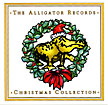 Here's a whole album of mostly original blues tunes for the holiday from 1992, played by some first-class, brand-name blues musicians from the Alligator label. Koko Taylor kicks off with her own "Merry, Merry Christmas, and other originals issue from Lil' Ed and the Blues Imperials, Kenny Neal, Lonnie Brooks, William Clarke, Little Charlie and the Nightcats, Gatemouth Brown and Saffire -- The Uppity Blues Women, whose "One Parent Christmas" is topical enough to hit as a novelty record. Of the covers, Katie Webster swings a great boogie-woogie "Deck the Halls," Tinsley Ellis takes on Mack Rice's "Santa Claus Wants Some Lovin'," Charles Brown does a nice period-sounding "Boogie Woogie Santa Claus," Elvin Bishop goes for it on "Little Drummer Boy" and Charlie Musselwhite closes with "Silent Night" on harmonica. Blues fans will eat this up, but there's plenty here for everyone else, too.
Here's a whole album of mostly original blues tunes for the holiday from 1992, played by some first-class, brand-name blues musicians from the Alligator label. Koko Taylor kicks off with her own "Merry, Merry Christmas, and other originals issue from Lil' Ed and the Blues Imperials, Kenny Neal, Lonnie Brooks, William Clarke, Little Charlie and the Nightcats, Gatemouth Brown and Saffire -- The Uppity Blues Women, whose "One Parent Christmas" is topical enough to hit as a novelty record. Of the covers, Katie Webster swings a great boogie-woogie "Deck the Halls," Tinsley Ellis takes on Mack Rice's "Santa Claus Wants Some Lovin'," Charles Brown does a nice period-sounding "Boogie Woogie Santa Claus," Elvin Bishop goes for it on "Little Drummer Boy" and Charlie Musselwhite closes with "Silent Night" on harmonica. Blues fans will eat this up, but there's plenty here for everyone else, too.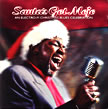 This contemporary blues collection came out of Canada in 2002, made up mostly of blues originals, although there's a sweet shuffle of "White Christmas" by Curley Bridges and a walking bass version of "Winter Wonderland" by Mel Brown and the Homewreckers. That band kicks off this CD with "Don't Plan No Party This Christmas," a wronged husband's complaint, and that's followed by Jack de Keyzer's "The Twelve Blue Days of Christmas," which turns the traditional holiday round into a foray through blues history, evoking lyrical ready-mades as well as the styles of some famous players. "Country Christmas Blues" by Rick Fines is just as advertised, an acoustic country blues ballad. The rest of the album, featuring players like Willie "Big Eyes" Smith, Snooky Pryor and Chris Whiteley, is more of the same, a holiday trip through numerous blues styles, all strong performances.
This contemporary blues collection came out of Canada in 2002, made up mostly of blues originals, although there's a sweet shuffle of "White Christmas" by Curley Bridges and a walking bass version of "Winter Wonderland" by Mel Brown and the Homewreckers. That band kicks off this CD with "Don't Plan No Party This Christmas," a wronged husband's complaint, and that's followed by Jack de Keyzer's "The Twelve Blue Days of Christmas," which turns the traditional holiday round into a foray through blues history, evoking lyrical ready-mades as well as the styles of some famous players. "Country Christmas Blues" by Rick Fines is just as advertised, an acoustic country blues ballad. The rest of the album, featuring players like Willie "Big Eyes" Smith, Snooky Pryor and Chris Whiteley, is more of the same, a holiday trip through numerous blues styles, all strong performances.
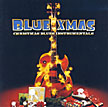 No running afoul of the consumer protection laws here, the title says it all. This 2001 collection, produced by Carla Olson of Textones fame, was specially recorded for Evidence. Rather than a collection of submissions by individual artists, Olson rounded up a house band to back a who's who of contemporary blues performers. The Mistletunes bias toward vocal music has been noted elsewhere on the site, but anyone inclined toward this kind of thing will have nothing to worry about; there's equal weight given to the original melodies of the songs as opposed to the riffing and improvisation that is so much a part of the blues. The song selection consists entirely of familiar carols and pop standards with strong enough melodies to stand up to a blues interpretation. It's really difficult to break out who's featured on each song, as the house band sometimes takes over from the lead musicians, so I'll just list some of the players: guitarists Denny Freeman, Otis Rush, Guitar Shorty, Rusty Zinn, Son Seals, Alan Youngblood Hart, Becky Barksdale, Albert Carter, Walter Trout, Joe Louis Walker, Tommy Castro and South Side Slim; harmonica players Kim Wilson, Charlie Musselwhite, Paul Oscher and Sugar Blue; saxophonists Ernie Watts and Tom Jr. Morgan; bass, Phil Upchurch; drums, Alvino Bennett; organ, Deacon Jones; and piano, Barry Goldberg.
No running afoul of the consumer protection laws here, the title says it all. This 2001 collection, produced by Carla Olson of Textones fame, was specially recorded for Evidence. Rather than a collection of submissions by individual artists, Olson rounded up a house band to back a who's who of contemporary blues performers. The Mistletunes bias toward vocal music has been noted elsewhere on the site, but anyone inclined toward this kind of thing will have nothing to worry about; there's equal weight given to the original melodies of the songs as opposed to the riffing and improvisation that is so much a part of the blues. The song selection consists entirely of familiar carols and pop standards with strong enough melodies to stand up to a blues interpretation. It's really difficult to break out who's featured on each song, as the house band sometimes takes over from the lead musicians, so I'll just list some of the players: guitarists Denny Freeman, Otis Rush, Guitar Shorty, Rusty Zinn, Son Seals, Alan Youngblood Hart, Becky Barksdale, Albert Carter, Walter Trout, Joe Louis Walker, Tommy Castro and South Side Slim; harmonica players Kim Wilson, Charlie Musselwhite, Paul Oscher and Sugar Blue; saxophonists Ernie Watts and Tom Jr. Morgan; bass, Phil Upchurch; drums, Alvino Bennett; organ, Deacon Jones; and piano, Barry Goldberg.
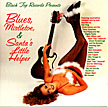 This collection of Texas and Louisiana bands from 1995 takes a bluesy look at the holiday with a mix of originals and standards, although Grady Gaines' "Grady and Santa Is Coming To Town" is probably better known by the title it would have if Santa came by himself. Likewise, "Joe's Christmas Salutations" by Big Joe and the Dynaflows sounds a lot like "Merry Christmas Baby." Rick Holmstrom's "Sleigh Ride" is the traditional song done in a fast shuffle, and Sam Myers with Anson Funderburgh and the Rockets does a credible job on Lowell Fulsom's "Lonesome Christmas." Robert Ward's "Wouldn't It Be a Merry Christmas" is uptempo in tone, if not in rhythm. Mark Wilson and Kaz Kazanoff do a jazz horn chorus version of "Good King Wenceslaus" and Bill Kirchen's "Santa! Don't Pass Me By" is flat-out country. A good blues album with lots of distinctive cuts. And by the way, the record company thoughtfully offered a poster version of the CD cover back in the day.
This collection of Texas and Louisiana bands from 1995 takes a bluesy look at the holiday with a mix of originals and standards, although Grady Gaines' "Grady and Santa Is Coming To Town" is probably better known by the title it would have if Santa came by himself. Likewise, "Joe's Christmas Salutations" by Big Joe and the Dynaflows sounds a lot like "Merry Christmas Baby." Rick Holmstrom's "Sleigh Ride" is the traditional song done in a fast shuffle, and Sam Myers with Anson Funderburgh and the Rockets does a credible job on Lowell Fulsom's "Lonesome Christmas." Robert Ward's "Wouldn't It Be a Merry Christmas" is uptempo in tone, if not in rhythm. Mark Wilson and Kaz Kazanoff do a jazz horn chorus version of "Good King Wenceslaus" and Bill Kirchen's "Santa! Don't Pass Me By" is flat-out country. A good blues album with lots of distinctive cuts. And by the way, the record company thoughtfully offered a poster version of the CD cover back in the day.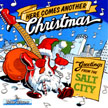 This 1993 regional compilation hails from the Syracuse, N.Y. region and consists mainly of originals with a bluesy tinge. Only "The Christmas Song," "Back Door Santa" and "Blue Christmas" are covers, and their arrangements are no surprises, except for Mark Doyle's vocal intro of "Have Yourself a Merry Little Christmas" in the beginning of his instrumental version of "The Christmas Song." Tom Townsley and the Backsliders cut loose with an original New Year's song, "Resolution Blues." Notable originals include Gary Frenay and Lil' Georgie's "Santa Man," Z-Bones' "Here Comes Another Christmas" and Muddpuppies' "Silent Night, Lonely Night." Kim Lembo does a great blues mama take with Ronnie D's "Under My Tree," too. Mostly blues oriented, but well done. UPDATE: The Muddpuppies' song gets an update in 2009 from its original vocalist.
This 1993 regional compilation hails from the Syracuse, N.Y. region and consists mainly of originals with a bluesy tinge. Only "The Christmas Song," "Back Door Santa" and "Blue Christmas" are covers, and their arrangements are no surprises, except for Mark Doyle's vocal intro of "Have Yourself a Merry Little Christmas" in the beginning of his instrumental version of "The Christmas Song." Tom Townsley and the Backsliders cut loose with an original New Year's song, "Resolution Blues." Notable originals include Gary Frenay and Lil' Georgie's "Santa Man," Z-Bones' "Here Comes Another Christmas" and Muddpuppies' "Silent Night, Lonely Night." Kim Lembo does a great blues mama take with Ronnie D's "Under My Tree," too. Mostly blues oriented, but well done. UPDATE: The Muddpuppies' song gets an update in 2009 from its original vocalist.
 Two appearances by the grandfather of rockin' Christmas, Charles Brown, highlight this 1995 compilation of blues holiday tunes. He solos on Hammond B3 organ while singing a medley of his two best-known Yule tunes, "Merry Christmas Baby" and "Please Come Home For Christmas," then duets with Johnny Otis on Charles' "Christmas Comes But Once a Year." Later, Luther "Guitar Junior" Johnson does a full band version of "Merry Christmas Baby," an uptempo one at that. The Memphis Horns help out on Little Jimmy King's "Happy Christmas Blues" and Larry Davis' "Help the Poor." Smokin' Joe Kubek with Bnois King do "Poor Man's X-mas" and Lowell Fulson performs his own "Lonesome Christmas." (I'm not sure of the history of this song; it's been out for years, but this sounds like a recent re-recording of it. Bob Bailey confirms my suspicion that Fulson has recorded it numerous times.) The Preston Shannon Band does "X-mas Blues" and Michelle "Evil Gal" Wilson takes on Pearl Bailey's "Five Pound Box of Money" in an arrangement that's faithful to the original. Outside the regular Christmas theme are Champion Jack Dupree's "Freedom" and The Persuasions doing the Brecht-Weill "Oh Heavenly Salvation," the latter more appropriate since Sept. 11, 2001.
Two appearances by the grandfather of rockin' Christmas, Charles Brown, highlight this 1995 compilation of blues holiday tunes. He solos on Hammond B3 organ while singing a medley of his two best-known Yule tunes, "Merry Christmas Baby" and "Please Come Home For Christmas," then duets with Johnny Otis on Charles' "Christmas Comes But Once a Year." Later, Luther "Guitar Junior" Johnson does a full band version of "Merry Christmas Baby," an uptempo one at that. The Memphis Horns help out on Little Jimmy King's "Happy Christmas Blues" and Larry Davis' "Help the Poor." Smokin' Joe Kubek with Bnois King do "Poor Man's X-mas" and Lowell Fulson performs his own "Lonesome Christmas." (I'm not sure of the history of this song; it's been out for years, but this sounds like a recent re-recording of it. Bob Bailey confirms my suspicion that Fulson has recorded it numerous times.) The Preston Shannon Band does "X-mas Blues" and Michelle "Evil Gal" Wilson takes on Pearl Bailey's "Five Pound Box of Money" in an arrangement that's faithful to the original. Outside the regular Christmas theme are Champion Jack Dupree's "Freedom" and The Persuasions doing the Brecht-Weill "Oh Heavenly Salvation," the latter more appropriate since Sept. 11, 2001.
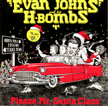 Johns and his band are a regional bar band attraction, and this 1990 album is about what you would expect when such an ensemble gets together and says, "Hey! Let's make a Christmas album!" Johns writes or co-writes most of the nine songs here, and the originals are mainly instrumentals that do little to suggest Christmas apart from their titles; "Mule Size Yuletide," for example, is a jam on the riff from "Day Tripper." And I have no idea what a cover of "Telstar" has to do with Christmas. UPDATE: Jay Karr enlightens us: Telstar, the first communications satellite, was launched in 1962 by the U.S. on behalf of AT&T. Famed British producer Joe Meek was inspired by this event, probably because Telstar's Earth receiving station was the BBC's Goonhilly Down facility, to record the original song with the band The Tornados. It went on to become a worldwide smash and was even reputed to be Queen Elizabeth II's favorite song -- she even worked a mention of Telstar into her Christmas address that year. End update. The vocal version of the title song is not bad, and "The Little Cajun Drummer Boy" is exactly what it sounds like, a Cajun version of the classic carol.
Johns and his band are a regional bar band attraction, and this 1990 album is about what you would expect when such an ensemble gets together and says, "Hey! Let's make a Christmas album!" Johns writes or co-writes most of the nine songs here, and the originals are mainly instrumentals that do little to suggest Christmas apart from their titles; "Mule Size Yuletide," for example, is a jam on the riff from "Day Tripper." And I have no idea what a cover of "Telstar" has to do with Christmas. UPDATE: Jay Karr enlightens us: Telstar, the first communications satellite, was launched in 1962 by the U.S. on behalf of AT&T. Famed British producer Joe Meek was inspired by this event, probably because Telstar's Earth receiving station was the BBC's Goonhilly Down facility, to record the original song with the band The Tornados. It went on to become a worldwide smash and was even reputed to be Queen Elizabeth II's favorite song -- she even worked a mention of Telstar into her Christmas address that year. End update. The vocal version of the title song is not bad, and "The Little Cajun Drummer Boy" is exactly what it sounds like, a Cajun version of the classic carol.
